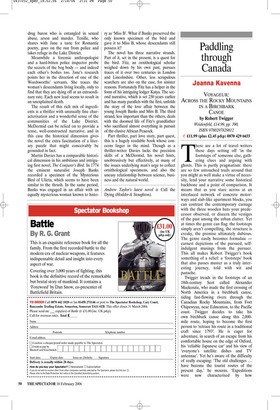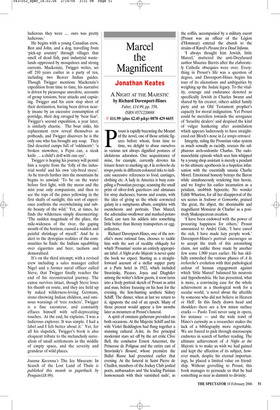Paddling through Canada
Joanna Kavenna
VOYAGEUR: ACROSS THE ROCKY MOUNTAINS IN A BIRCHBARK CANOE by Robert Twigger Weidenfeld, £14.99, pp. 390, ISBN 9780297829812 ✆ £11.99 (plus £2.45 p&p) 0870 429 6655 There are a lot of travel writers these days setting off ‘in the footsteps of’ someone else, gathering clues and arguing with ghosts. This is partly pragmatism: there are so few untouched trails around that you might as well make a virtue of necessity, lend your narrative some historical backbone and a point of comparison. It means that as you stare across at an interlaced network of concrete motorways and slab-like apartment blocks, you can contrast the contemporary carnage with the three wooden huts your predecessor observed, or discern the vestiges of the past among the urban clutter. Yet at times the genre can flag: the footsteps simply aren’t compelling, the structure is creaky, the premise ultimately dubious. The genre easily becomes formulaic earnest depictions of the pursued, selfindulgent musings from the pursuer. This all makes Robert Twigger’s book something of a relief: a ‘footsteps’ book that also passes muster as a truly interesting journey, told with wit and panache.
Twigger treads in the footsteps of an 18th-century Scot called Alexander Mackenzie, who made the first crossing of North America in a birchbark canoe, riding fast-flowing rivers through the Canadian Rocky Mountains, from Fort Chipewyan, near Edmonton, to the Pacific coast. Twigger decides to take his own birchbark canoe along this 2,000mile route, hoping to become the first person to ‘retrace his route in a traditional craft since 1793’. He is eager for adventure, in search of an escape from his comfortable house on the edge of Oxford, his ‘reliable Japanese car’ and his view of ‘everyone’s satellite dishes and TV antennae’. Yet he’s aware of the difficulty of really escaping: ‘The old challenges ... have become the tourist routes of the present day,’ he mourns. ‘Expeditions were now characterised by how ludicrous they were ... ours was pretty ludicrous.’ He begins with a young Canadian crew, Ben and John, and a dog, travelling from ‘pick-up country’ through villages that smell of dead fish, past industrial wastelands oppressed by mosquitoes and strong currents. Mackenzie, Twigger writes, set off 210 years earlier in a party of ten, including two Beaver Indian guides. Though Twigger mentions Mackenzie’s expedition from time to time, his narrative is driven by picaresque anecdote, accounts of group tensions, bear attacks and capsizing. Twigger and his crew stop short of their destination, having been driven nearly insane by an excessive consumption of porridge, their dog ravaged by ‘bear fear’. Twigger’s second expedition, a year later, is similarly chaotic. The boat sinks, his replacement crew reveal themselves as potheads, and Twigger discovers he is the only one who has brought any soap. They find deserted camps full of ‘oddments’: ‘a broken snowshoe, a Pepsi can, a steak knife ... a child’s doll with one eye’.
Twigger is hoping his journey will permit him a respite from the ‘folly of the industrial world’ and his own ‘city-bred stress’. As he travels further into the mountains he begins to unwind: ‘To be on the water before first light, with the moon and the mist your only companions, and then to see the tops of the pines yellowing in the first shafts of sunlight, this sort of experience confirms the overwhelming and subtle beauty of the wild.’ Yet, at times, he finds the wilderness simply disconcerting: ‘The sudden magnitude of the place, the mile-wideness of the river, the gaping mouth of the horizon, caused a sudden and painful shrinkage of myself.’ And he is alert to the dystopian realities of the communities he finds: the Indians squabbling over cigarettes and beer, taciturn and demoralised.
It’s on the third attempt, with a revised crew including a sales manager called Nigel and a former naval officer called Steve, that Twigger finally reaches the end of his reconstructed journey. The canoe survives intact, though Steve loses his thumb en route, and they are held up by naked wilderness-loving Germans, stone-throwing Indian children, and ominous warnings of ‘tree rockets’. Twigger is a fine raconteur, and constantly effaces himself with self-deprecating touches. At the end, he explains, ‘I was a ludicrous explorer. It was simple. I had a label and I felt better about it.’ Yet, for all his slapstick, Twigger’s book is also eloquent tribute to the melancholy surrealism of small settlements in the middle of empty space, and the severity and grandeur of wild places.



















































































 Previous page
Previous page